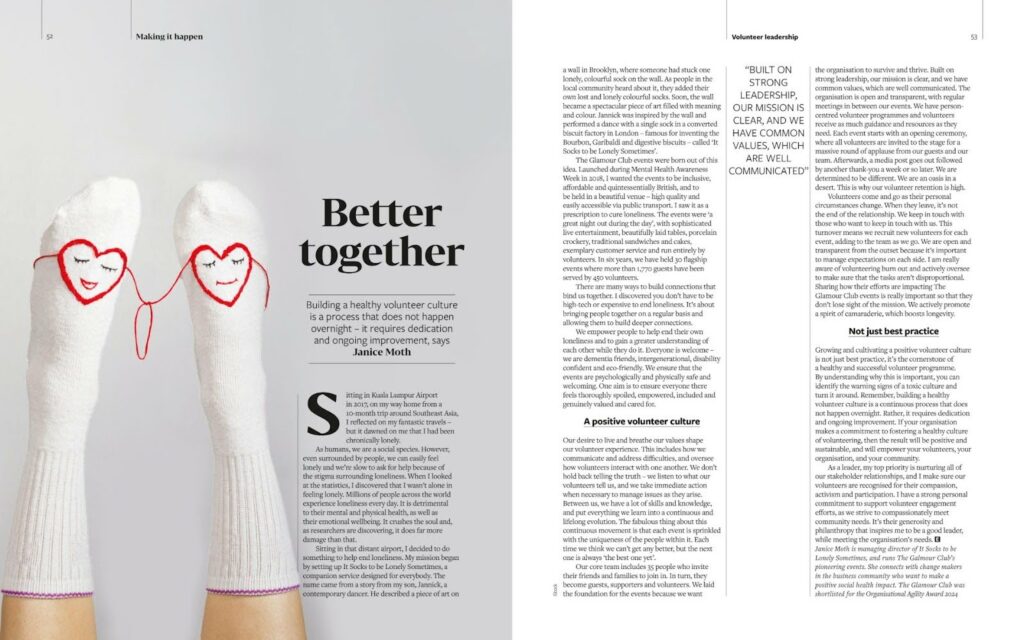Volunteer recruitment and engagement

Members of the Tackling Loneliness Hub recently came together for a co-working session on volunteer management. In this blog post, we have captured the key points from our expert panellists and members who shared their expertise and contributed to the discussion. A huge thank you to our panellists: Emily Cook (Age UK Hammersmith & Fulham), Sophie Dearman (Whizz Kidz) and Matt Wright (Hull CVS). If you’re a member of the Hub, take a look at the Volunteering Group to access a copy of their slides.

The importance of good volunteer management
Volunteers play a vital role in our organisations, whether through providing extra capacity for organisational support functions, or through direct support to help people feel more connected.
Good volunteer management encompasses strategies and processes for recruitment, engagement, and retention of a diverse and dedicated group of people. The loss of even one volunteer can pose a significant setback for organisations, and so the challenge facing volunteer managers is not only in terms of recruiting volunteers, but keeping volunteers engaged and committed.
Setting expectations during volunteer recruitment
The foundation for a successful volunteer programme lies in strategic recruitment. Investing time in recruiting volunteers who are committed to dedicating a minimum requirement of hours (often one to three hours a week for at least six to twelve months) pays off in the long run as it can reduce the likelihood of premature departures. Matching volunteers with roles that align with their skills and interests also sets the stage for a lasting connection.
Providing structured volunteer support
Following a successful recruitment process, structured support is vital for volunteer satisfaction and retention. At Age UK Hammersmith and Fulham, volunteers are assigned to service leads who conduct regular support and supervision sessions every three or four months. These sessions help to address volunteers’ concerns, offer guidance, recognise achievements, and ensure volunteers feel valued and supported throughout the process.
Building community among volunteers
Volunteering is not only a great way of sharing skills, time and expertise for a worthwhile cause, it is also a great way of making new connections. For people who are feeling lonely, volunteering has been shown to help people to feel more connected, and some people may seek out volunteering opportunities for this very reason. This means that fostering a sense of belonging among volunteers and ensuring good channels of communication between volunteers and volunteer managers is even more important.
Ideas shared by panellists to help build community among volunteers, even if they volunteer remotely, include:
- Using digital platforms like Workplace by Facebook to create role-specific groups for volunteers to share achievements and stay informed about the broader community.
- Holding regular online meetings for knowledge-sharing, and focusing on positive elements of how volunteers can help to address loneliness.
- Opportunities for in-person social activities for volunteers to meet each other and share and celebrate their successes.
Recognising and rewarding volunteers
Recognition and rewards play a crucial role in fostering volunteer loyalty. From loyalty pins awarded after one, five, and ten years, to regular volunteer parties and ceremonies, making volunteers feel valued is paramount. Initiatives that reward and recognise volunteers serve as visible symbols of appreciation which can help to foster pride and commitment within the volunteer community. Maintaining a database of awards and acknowledgments ensures a fair distribution of recognition among volunteers.
Navigating transitions and continuous improvement
Volunteers leaving their role is unfortunately inevitable, but approaching it as a transition rather than a definitive end point can be helpful for all. Understanding volunteers’ reasons for wanting to leave and exploring flexible solutions, such as adjusting schedules or transitioning volunteers to remote roles, can help to retain valuable contributors.
Whether or not adjustments are possible, ending on a positive note is helpful for future volunteer recruitment efforts. Making departing volunteers feel valued, leaving the door open for their return, and making clear notes on their profiles ensures that recruitment efforts are focused on individuals likely to return. This can also help to avoid spending unnecessary time and resources on recruiting someone who is not interested.
Conducting exit interviews for departing volunteers may be time-intensive but proves invaluable for continuous learning and improvement. The feedback shared as part of this process can be used for future volunteer recruitment efforts, as well as being used to inform the volunteer experience as a whole.
Volunteer management processes and tools
The importance of CRM systems for efficient volunteer management, including recognition and feedback mechanisms, were emphasised.
- At Hull CVS, they use a volunteer platform called “Time to Volunteer” which shares volunteer management templates, processes, and policies that can be used and adapted by organisations.
- At Whizz Kidz, they have a Volunteers’ Zone for volunteers to create their own accounts, manage their details and sign-up to volunteer at events around the UK.
The group also discussed recruitment strategies for volunteers, and suggested selecting one advertising platform to avoid spreading yourself too thinly.
Useful resources and further support
A range of resources and useful links were shared by members as part of the discussion:
- Volunteering Insight Report (Tackling Loneliness Hub) – Insights from an earlier Hub member event on barriers to volunteer recruitment, and what members found worked well.
- Volunteering Wellbeing: What works and who benefits (What Works Wellbeing) – A review of the links between volunteering and wellbeing, with a theory of change and a briefing with advice for volunteer managers.
- Volunteering through social prescribing routes for wellbeing (NASP) – A guide to help volunteer-involving organisations support people who may come to volunteering as part of a social prescribing journey.
Do you have further volunteering resources that help you? Please do share in the Volunteering Group and let us know what further support on volunteer management you would like to see on the Hub.





Responses